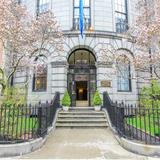- The mission of the college is to provide high-quality associate degree education and to prepare beginning practitioners in nursing and allied health fields. Inherent in the Catholic identity of the college and our educational mission is a commitment to Judaeo-Christian principles which influence the academic curricula and the college environment. Consistent with these principles, the college seeks to give opportunities to a diverse population of students to continue their education as mature adults and responsible world citizens.
School Highlights
Laboure College of Healthcare serves 1,829 students (10% of students are full-time).
The college's student-teacher ratio of 13:1 is higher than the state community college average of 12:1.
Minority enrollment is 68% of the student body (majority Black), which is more than the state average of 57%.
Quick Facts (2026)
- Enrollment: 1,829 students
- Private-state tuition: $33,507
- Acceptance Rate: 75%
- Student-teacher ratio: 13:1
- Minority enrollment: 68%
- Source: Verified school update
Top Rankings
Laboure College of Healthcare ranks among the top 20% of public schools in Massachusetts for:
Category
Attribute
School Resources
School Overview
The teacher population of 137 teachers has stayed relatively flat over five years.
Laboure College of Healthcare
(MA) Community College Avg.
Carnegie Classification
Special Focus Four-Year: Other Health Professions Schools
Associate's Colleges: Mixed Transfer/Career & Technical-Mixed Traditional/Nontraditional
Institution Level
Four or more years
At least 2 but less than 4 years
Institution Control
Private not-for-profit
Public
Total Faculty
137 staff
290 staff
School Calendar
Student Body
The student population of Laboure College of Healthcare has grown by 53% over five years.
The student-teacher ratio of 13:1 has decreased from 20:1 over five years.
The Laboure College of Healthcare diversity score of 0.69 is less than the state average of 0.74. The school's diversity has grown by 7% over five years.
Total Enrollment
1,829 students
2,687 students
Student-Teacher Ratio
13:1
12:1
# Full-Time Students
181 students
1,039 students
# Part-Time Students
1,648 students
1,648 students
# Enrollment Undergraduate
182 students
278 students
# Full-Time Undergraduate Students
181 students
839 students
# Full-Time Graduate Students
n/a
217 students
# Part-Time Undergraduate Students
1,648 students
1,619 students
# Part-Time Graduate Students
n/a
346 students
Total Dormitory Capacity
n/a
400 students
% American Indian/Alaskan
n/a
n/a
% Asian
3%
6%
% Hispanic
13%
21%
% Black
43%
15%
% White
32%
43%
% Hawaiian
n/a
1%
% Two or more races
3%
3%
% Non Resident races
1%
2%
% Unknown races
5%
9%
Diversity Score
0.69
0.74
College Completion Rate (Students who graduate in less than 4 years)
n/a
21%
College Completion Rate (Students who graduate in 4 years or more than 4 years)
1%
45%
Average Graduate Earnings (10 Years)
$54,800
$35,500
Tuition and Acceptance Rate
The private state tuition of $33,507 is more than the state average of $30,006. The private state tuition has stayed relatively flat over four years.
Private State Tuition Fees
$33,507
$30,006
% Students Receiving Some Financial Aid
100%
87%
Median Debt for Graduates
$25,250
$11,249
Median Debt for Dropouts
$9,500
$5,500
Acceptance Rate
75%
75%
SAT Reading
n/a
540
SAT Math
n/a
535
SAT Writing
n/a
480
ACT Composite
n/a
21
Extracurriculars
Total ExtracurricularsTotal Extra-curric.
2 extracurriculars
ExtracurricularsExtra-curric.
Club or Organization:
Nursing ClubStudent Government Association
Source: 2024 (or latest year available) Integrated Postsecondary Education Data System (IPEDS) , School Administrators
School Notes
- Our college is a small, private college affiliated with Caritas Christi Health Care. With numerous clinical affiliations that include academic medical centers, teaching and community hospitals, the college is committed to preparing its graduates to deliver patient-centered care as valued members of the health care team. Adults and traditional-aged students will find the flexible scheduling, small classes, and personal attention an ideal learning environment. Our alumni can be found in a wide variety of health care settings, including Boston's finest academic medical centers, teaching hospitals, and numerous health care facilities throughout New England, the nation, and the world. Founded in 1892 and re-established in 1971 with degree-granting authority, the college has an unbroken line of preparing health professionals for practice dating back to the Carney Hospital Training School for Nurses and the Catherine Labour School of Nursing. Our college offers associate degree (AS) and professional certificate programs exclusively in health care. Our faculty and staff are committed to preparing individuals to deliver patient-centered care as members of an interdisciplinary team. Our college promotes learning that emphasizes evidence-based practice, including the latest research and the clinical expertise, quality improvement approaches, and the use of information technology. We are accredited by the New England Association of Schools and Colleges. Membership in the association indicates that the college has been carefully evaluated and found to meet standards agreed upon by qualified educators.
Frequently Asked Questions
How much does Laboure College of Healthcare cost?
Laboure College of Healthcare's private state tuition is approximately $33,507.
What is the acceptance rate of Laboure College of Healthcare?
The acceptance rate of Laboure College of Healthcare is 75%, which is equal to the state average of 75%.
What is Laboure College of Healthcare's ranking?
Laboure College of Healthcare ranks among the top 20% of community college in Massachusetts for: Percent of students receiving financial aid.
Recent Articles

5 Key Community College Trends Parents Should Know in 2026
Explore major 2026 community college trends including enrollment changes, costs, career programs, and affordability for parents planning college decisions.

Average Community College Tuition Cost 2026 Update
Explore updated 2026 community college tuition averages, cost trends, planning tips, admissions timing advice, and financial strategies for families and students.

Preparing for Placement Tests in 2026: Student Guide
Preparing for Placement Tests in 2026, what students, parents, and educators need to know about formats, prep strategies, and placement changes.











